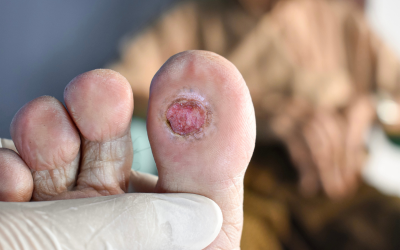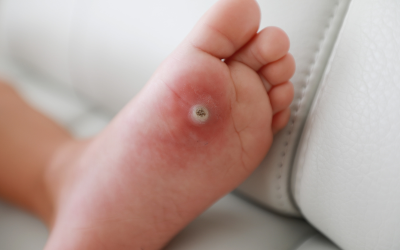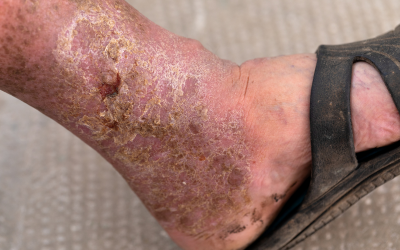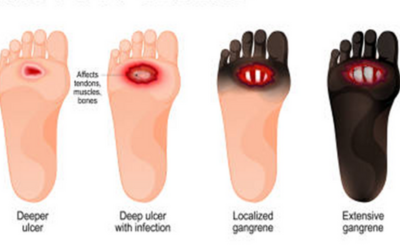Diabetic Foot Surgeon in Panvel
Living with diabetes is not only about monitoring blood sugar—it can also bring serious complications that affect daily life. One of the most concerning among them is diabetic foot conditions, which impact mobility, independence, and overall health. Globally, the World Health Organization estimates that around 422 million people live with diabetes, and nearly 15% of them will develop a diabetic foot ulcer at some point in their lives. In India, where over 77 million people are diagnosed with diabetes, foot-related issues remain one of the leading causes of hospitalization.
At Doctors’ Galaxy Multispeciality Clinic in Panvel, the focus is not only on correcting the problem but also on understanding the root cause. With in-house facilities for advanced diagnostics and specialized consultations, patients receive seamless care without the stress of running from one facility to another.
Dr. Prashant Manohar Gaikwad, an accomplished Endocrinologist, explains:
“Diabetic foot problems are not just skin-deep. They reflect the hidden impact of diabetes on nerves, circulation, and tissue healing. Addressing them early is crucial, not only to save the limb but also to protect a person’s overall health and quality of life.”

Dr. Nandkishor Eknath Narwade
Consultant General Surgeon & Professor – Minimal Invasive Surgery Expert
Experience:20+ years
But why is timely care so important? Because every small wound can progress into a severe complication if not treated correctly.
Why Choose Our Diabetic Foot Surgery Services?
When it comes to diabetes-related foot concerns, the stakes are high. Proper treatment requires a balance of advanced surgical expertise, modern diagnostics, and compassionate care. That’s where our approach stands out.
Here are key reasons why patients prefer our services:
Holistic Evaluation: We address underlying issues like circulation problems, infections, or nerve damage.
Precision Diagnostics: Modern lab and imaging tests ensure accurate results for faster decision-making.
Tailored Surgery: Every procedure is customized based on the patient’s overall health and diabetic profile.
Integrated Recovery Plan: Post-surgical rehabilitation and preventive care reduce recurrence.
Dr. Prashant Manohar Gaikwad, an insightful Endocrinologist in Panvel, notes: “Surgery is not the end of the story. What defines success is how well a patient heals and how confidently they can return to their daily life. That’s why aftercare and education are as critical as the surgical procedure itself.”
Common Conditions Treated by Diabetic Foot Surgeons
Many people assume foot pain or small wounds are harmless. But for individuals with diabetes, these symptoms can indicate serious complications.
Some of the most common conditions treated include:

Foot Ulcers
Open sores that may become infected if ignored. Advanced foot ulcer treatment in Panvel ensures these are managed with precision to prevent complications.

Diabetic Neuropathy
A condition where nerve damage causes numbness, burning, or tingling sensations. This lack of sensation often leads to unnoticed injuries. Many patients benefit from early care for diabetic neuropathy in Panvel.

Infections
Bacterial or fungal infections can spread quickly in diabetic feet. Surgical cleaning or antibiotics may be required.

Gangrene
Severe tissue damage caused by poor circulation may sometimes necessitate reconstructive or removal procedures.

Charcot Foot
A deformity where weakened bones and joints collapse, leading to a misshapen foot.
Our Multidisciplinary Diabetes Team in Panvel believe: “Every foot condition in a diabetic patient tells a deeper story. It could be poor blood flow, nerve damage, or an infection waiting to spread. Identifying these layers helps us design treatments that not only heal but also prevent future problems.”
Treatment Options for Diabetic Foot Complications
Treating diabetic foot complications is never one-size-fits-all. Surgeons and specialists often combine surgical and non-surgical techniques depending on the severity of the condition:
Wound Care Management – Cleaning, dressing, and debridement (removing dead tissue) to promote healing.
Antibiotic Therapy – Essential for infections that could otherwise spread rapidly.
Revascularization Procedures – Improving blood flow through angioplasty or bypass surgery in cases of poor circulation.
Integrated Recovery Plan: Post-surgical rehabilitation and preventive care reduce recurrence.
Surgical Interventions – Correcting deformities, draining abscesses, or in rare cases, amputations to save a patient’s life.

Orthotic Support – Custom footwear or braces to reduce pressure and improve walking comfort.
Lifestyle Guidance – Educating patients about foot hygiene, footwear, and early warning signs.
By combining these methods, patients can not only heal but also reduce the risk of recurrence.
Facilities at Our Clinic for Diabetic Foot Care
Quality treatment requires quality infrastructure. At Doctors’ Galaxy, everything patients need is available under one roof. Here’s what sets the facility apart:

State-of-the-Art Diagnostics
From lab tests to imaging, accurate results guide better decisions.

Advanced Surgical Tools
Modern equipment ensures safe and precise procedures.

In-House Pharmacy
Immediate access to prescribed medications.

Specialized Consultations
Access to endocrinologists, surgeons, and wound care experts.

Rehabilitation Support
Guidance on physiotherapy and mobility aids to promote recovery.
Dr. Prashant Manohar Gaikwad, a dedicated Endocrinologist in Panvel, emphasizes:
“Facilities matter because they directly influence the outcome. When diagnosis, surgery, and recovery support are coordinated seamlessly, patients experience faster healing and greater confidence in their journey.”
Frequently Asked Questions
1. When should I see a diabetic foot surgeon?
2. How often should diabetic patients get their feet checked?
3. Can diabetic foot surgery prevent amputations?
4. How long is recovery after surgery?
5. Are diabetic foot problems preventable?
Disclaimer: The information shared in this content is for educational purposes and not for promotional use.
